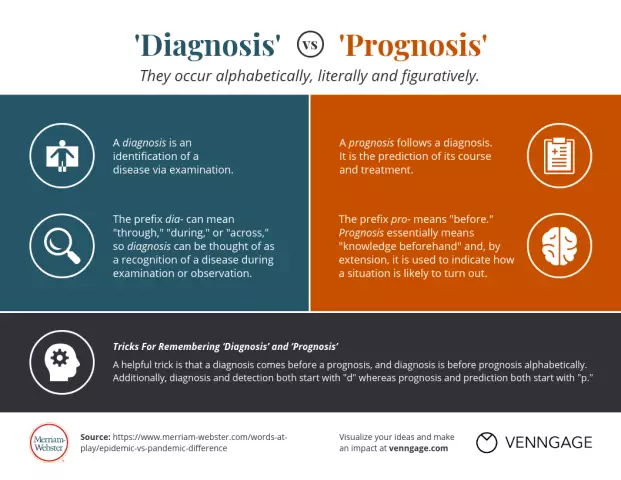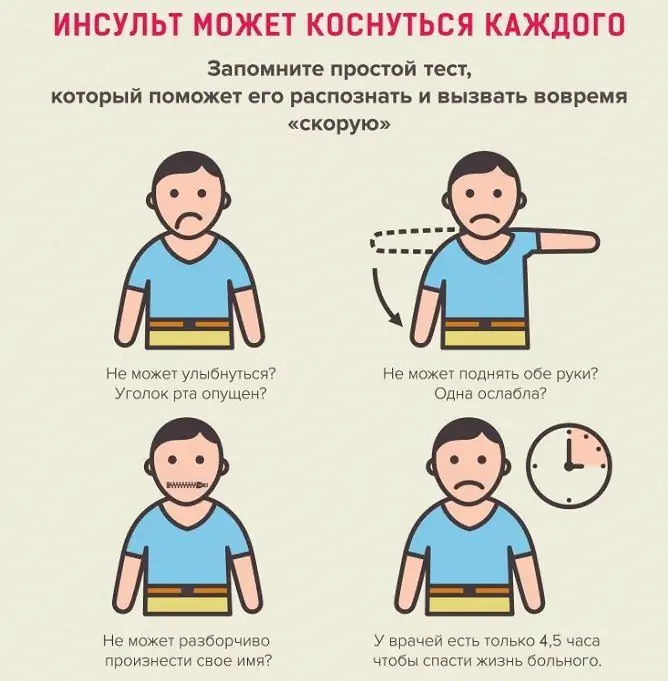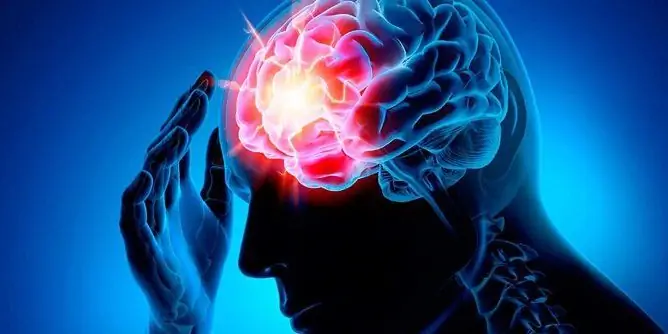- Author Rachel Wainwright wainwright@abchealthonline.com.
- Public 2023-12-15 07:39.
- Last modified 2025-11-02 20:14.
Paranoia

Chronic thought disorder that occurs with lesions of the brain and various mental diseases, characterized by the emergence of a logically built system of behavior, which is based on persecution mania, groundless jealousy and suspicion, is called paranoia.
The term was coined in 1863 by Karl Ludwig Kalbaum, until that moment paranoia was considered an independent mental disorder.
Such a system of behavior is usually unchanged, it could be considered absolutely adequate if initially pathological ideas were based on reality and were essentially correct.
The mildest form of the disease is called paranoid syndrome. The patient has a primary systematized persecution mania, groundless jealousy and hypochondriacal delirium. In addition to these manifestations, the paranoiac syndrome in some cases is accompanied by an erotic, litigious, high-born or monothematic delusion of reformism.
During paranoia, the content of pathological situations is often based on or includes many elements of reality, which are quite plausibly mixed in the patient's mind with his unhealthy imagination.
Treatment of paranoia in most cases is impossible, since patients completely refuse to resort to the help of specialists, considering themselves absolutely normal, and their ideas correspond to reality.
Causes of paranoia
It is impossible to say unequivocally what provokes the appearance of paranoia, but there are several assumptions. According to many psychiatrists, the condition can be provoked by unfavorable life circumstances, as well as the wrong reaction of a person to the changes taking place in his life.
Sigmund Freud believed that the real cause of paranoia is a delay or fixation that occurs at a certain stage in a child's sexual development, between the ages of 4 and 11, when boys play with boys and girls play with girls. If fixation occurs during this period, then it will certainly lead to the development of male aggression or alcoholism in the future, which will cause the development of paranoia.
Other psychologists believe that paranoia is provoked by a limited focus of stagnant excitement present in the patient's cerebral cortex. Because of this, an obstacle arises to the normal mobility of cortical processes, which entails the emergence of fantasies and implausible statements that remain in the patient's mind for a long period of time.
Another suspected cause of paranoia is a violation of metabolic processes in the brain associated with protein.
According to the latest assumptions put forward by American scientists, excessive consumption of caffeinated beverages may be the cause of paranoia. This relationship is explained by the ability of caffeine to stimulate chronic insomnia, diseases of the cardiovascular system and various types of psychosis, which, under certain circumstances, can develop into paranoia.
Many cases have been recorded when the syndrome developed in elderly people with degenerative processes in the brain, which include:
- Alzheimer's disease;
- Atherosclerotic vascular lesions of the brain;
- Parkinson's disease;
- Huntington's disease.
Probable causes of paranoia include taking certain types of drugs, alcohol, drugs and amphetamines.
Signs of paranoia
The classic signs of paranoia are:
- Unhealthy suspicion;
- The patient's tendency to see in random incidents the intrigues of enemies and conspiracy theories directed against his personality;
- From a very young age, a paranoid person stands out among their peers for high self-esteem, egocentrism, truth-seeking and a tendency to pass off their fantasies as real events.
In most cases, signs of paranoia are sudden conflicts with people around them, based on the patient's opinion that others envy him or want to belittle his dignity. Over time, the paranoid becomes more and more aggressive, resentful, vengeful, suspicious and distrustful, he is not able to perceive objective criticism, forgive and forget offenses. For some time, the progression of the disease may stop at this stage of development, but any traumatic event in the patient's life exacerbates the signs of paranoia.
Paranoia: Treatment
In most cases, the progression of paranoia is facilitated by the belief of the patient's loved ones in his delusional ideas, since at first glance they are quite logical. This delays the paranoid's visit to a psychiatrist and the diagnosis of the disease, as a result, the treatment of paranoia is postponed indefinitely and is delayed.

Another obstacle to the treatment of the disease is the patient's complete refusal to resort to the help of specialists, because in his opinion he is absolutely healthy, and his ideas are not “delusional”.
In cases where the patient still manages to persuade him to seek help, in a hospital setting he is prescribed antipsychotics, which have a predominantly anti-delusional effect, psychotherapy of various directions is much less often used as an element of a complex effect.
Treatment of paranoia is always difficult, since over time, the patient's suspicions begin to spread to the attending physician, and psychotherapy for paranoids is perceived as a way to control their consciousness.
Paranoia is a chronic disorder of thinking that occurs against the background of mental illness, degenerative processes or brain damage. The characteristic signs of the disease are persecution mania, suspicion, groundless jealousy and resentment of the patient, as well as his inability to accept criticism and forgive insults.
YouTube video related to the article:
The information is generalized and provided for informational purposes only. At the first sign of illness, see your doctor. Self-medication is hazardous to health!






